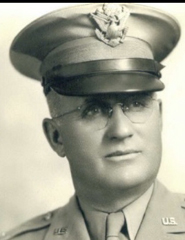Heavy Attacks Were Needed to Win Livergnano
(By FRANK MILES)
(Iowa Daily Press War Correspondent)
With the Fifth Army in Itlay (IDPA) -- Livergnano in North Italy, because it was occupied by strong nazi forces, was the target of terrific attacks of American artillery, dive bombers and infantrymen.
Col. Stanley J. Grogan, Fifth army public relations chief, Tom Durrance of Time and Life, and I were watching the "show", lying face down in the grass at the edge of a mountain road across a valley.
Uncle Sam's guns, big and little, from emplacements and tanks were hurling shells from all over the area behind and on each side of us.
Plane after plane was shooting down at terrific speed as if it would crash, unloading a lethal egg and shooting upward in bursts of enemy flak.
Whirs of machine rifles and pistols and cracks of rifles evidenced the charges of Yankee Doughboys to stiff resistance.
Plumes of black, white and red smoke in and around the target reflected hits from the skies and through the air.
We three onlookers turned our eyes from the fascinating scene at the voice of a GI, who had walked close enough to speak quietly without our hearing him.
Advises to Move
"Wouldn't you gentlemen like to get back, we are about to fire," he said.
About 100 feet up the road with its 3-inch gun set so the mouth of the barrel was only a bit higher than six-foot Durrance's cap was a caterpillared steel monster, looking hungry for nazi targets.
We answered the soldier's courteous suggestion by fairly sprinting toward a knoll where I saw two graves over which were plain wood crosses bearing German soldier's names.
Six projectiles with ear splitting, earth shaking concussions, tore from the tank gun in rapid succession. The huge machine then was maneuvered to a spot beyond a ridge.
"Jerry probably will drop a few right in their now," said Colonel Grogan, explaining the move.
We didn't stay to learn.
Enroute to another point we were on the road where Pvt. Howard Schaflke, Jewell, an army engineer, and I had hit the dirt at sound of an enemy shell the day before.
Found Live Grenade
Colonel Grogan halted our jeep and leaped out at sight of something at almost the same place where two Hawkeyes had been scared.
The colonel picked up a cartridge belt to which was attached a hand grenade with pin removed and lever taped down.
We wondered why the equipment had been discarded there.
Early the next day Livergnano was reported taken by our men.
The nazis have an unpleasant habit of withdrawing from a town, then bombarding it after their foes arrive.
That's what they did in Livergnnano in such volume. James Roper, a war correspondent, who entered about noon, had to stay inside a tank four and half hours before he dared venture out. When he broke away he cracked speed records to the Fifth army press camp.
Scores of ambulances on the roads attested to the deadliness of the fight for Livergnona in the American drive for Bologna.
Casualties Heavy.
One day shortly before it was captured I had noon chow with 16 infantrymen, who had been assigned to company aid and litter bearing duties up front because so many of the regulars on those hazardous jobs had been killed and wounded. We sat around a rickety old table in a war wracked old house, to eat C rations, canned beans and meat, with hard crackers from K rations, and to drink cocoa from canteen cups made in a fireplace in the room.
They were a great group, typical American youths from many states. Every one knew he might be carried back dead or injured on one of the stretchers they were taking up, but they talk about that?
No. Conversation subjects were mostly football, girls, amusing things they had seen, slow mail and usual GI gripes interspersed with numerous wisecracks.
"We need mountain goats," remarked a captain watching supplies-laden mules struggling up a trail. "We're them," grinned one doughboy to another in a tone too low for the officer to hear.
Source: Muscatine Journal News-Tribune, November 20, 1944
![]()

